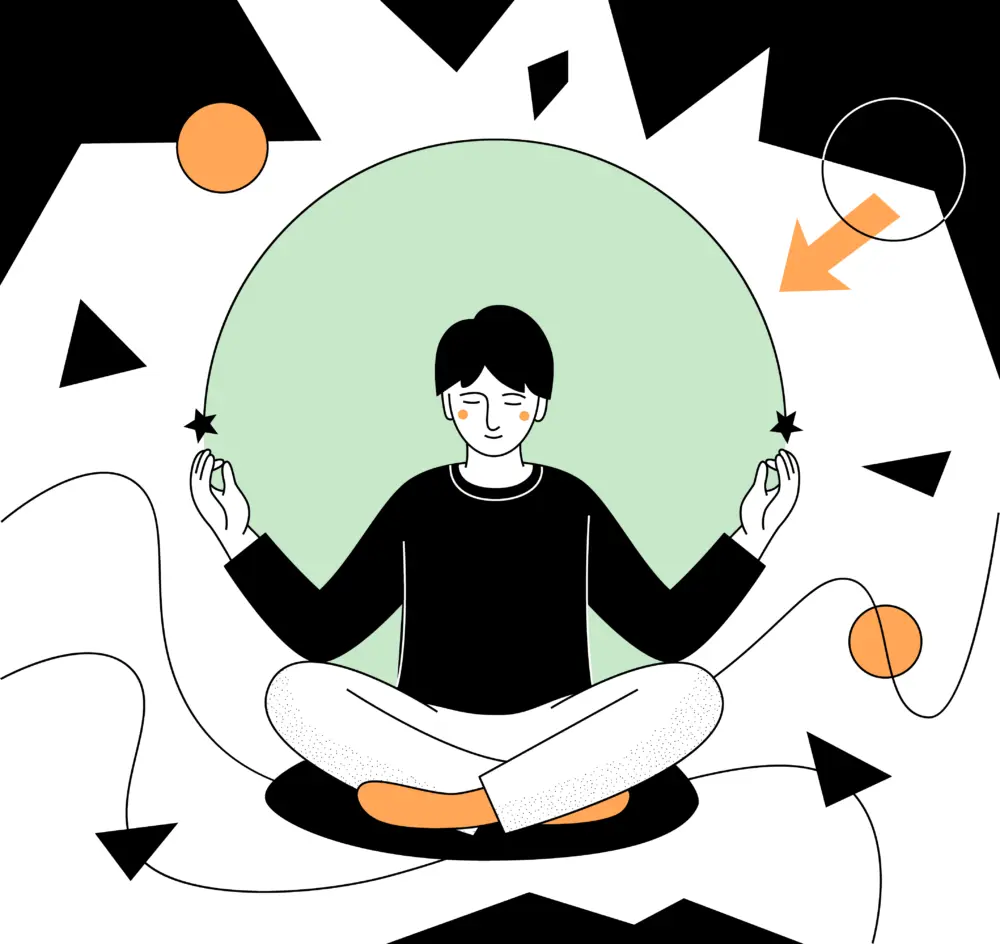Mindfulness meditation is a way to find balance, peace, and mental clarity. What exactly is mindfulness meditation? Where does it come from, and how can it benefit mental health and overall functioning? Let’s delve into this ancient practice that’s gaining modern recognition.
Understanding Mindfulness Meditation
Mindfulness meditation is a technique for focusing one’s attention on the present moment. It is about calmly acknowledging and accepting one’s feelings, thoughts, and bodily sensations. It’s about being fully present in the here and now without judgment or attachment to any passing thoughts or emotions.
Origins of Mindfulness Meditation
Mindfulness meditation origins trace back thousands of years to ancient Eastern traditions, particularly within Buddhism. The practice can be found in various forms across different cultures and religions, including Hinduism and Taoism.
One of the earliest and most influential sources of mindfulness meditation is found in the teachings of the Buddha. Buddha emphasized mindfulness as a path to spiritual enlightenment and liberation from suffering. Over time, mindfulness practices were adapted and integrated into various contemplative traditions, including Zen Buddhism and Vipassana meditation.
Redirection of Attention in Mindfulness Meditation
Mindfulness meditation involves the intentional redirection of attention to a chosen focal point, which serves as an anchor to the present moment. This simple practice forms the cornerstone of mindfulness techniques. It can be particularly beneficial when confronted with disturbing thoughts, anxiety cues, or negative automatic thoughts.
Understanding the Monkey Mind in Meditation Practices
The concept of the “Monkey Mind” originates from Buddhist teachings, particularly in relation to meditation practices. It refers to the restless, unsettled, and constantly wandering nature of the mind. Like a monkey swinging from branch to branch in a forest. Understanding the Monkey Mind and its effects on individuals undergoing meditation practices is crucial. It helps us navigate the challenges of inner distraction and cultivate a deeper state of mindfulness.
Characteristics of the Monkey Mind
- Restlessness: The Monkey Mind is characterized by a perpetual state of restlessness. Thoughts flit from one subject to another with little coherence or continuity.
- Distraction: Individuals experiencing the Monkey Mind often find it difficult to maintain sustained attention on a single object or focus. Such thoughts constantly pull them away in different directions.
- Impulsivity: Like a monkey impulsively grabbing at whatever catches its attention, the Monkey Mind leads individuals to react impulsively to stimuli, whether external or internal.
- Incessant Chatter: The mind under the influence of the Monkey Mind is filled with incessant mental chatter. These range from mundane concerns to anxious thoughts and inner dialogue.
Effects on Meditation Practice
- Difficulty in Concentration: The presence of the Monkey Mind makes it challenging for individuals to concentrate during meditation. The mind continually jumps from one thought to another, disrupting the focus on the chosen meditation object.
- Inner Turbulence: The Monkey Mind creates inner turbulence, hindering the development of tranquility and inner peace that meditation aims to cultivate. Instead of experiencing stillness and calmness, individuals may find themselves caught in a whirlwind of mental activity.
- Frustration and Impatience: Dealing with the Monkey Mind during meditation can evoke feelings of frustration, impatience, and self-criticism. Individuals may become discouraged by their inability to quiet the mind and achieve a state of deep concentration.
- Obstacle to Insight: The incessant chatter of the Monkey Mind can prevent individuals from accessing deeper layers of understanding. It acts as a barrier to insights and self-realization.

Benefits for Mental Health
The research discovered numerous mental health benefits of mindfulness meditation. It is garnering interest from psychologists, neuroscientists, and health practitioners worldwide. Here are some ways in which mindfulness meditation can positively impact mental health and overall functioning:
- Stress Reduction: Mindfulness meditation has been shown to reduce stress. It promotes relaxation and helps individuals cultivate a greater sense of calmness and equanimity in the face of life’s challenges.
- Improved Emotional Regulation: Mindfulness meditation enhances emotional regulation skills by increasing awareness of one’s thoughts and emotions without judgment. It allowes individuals to respond more skillfully to difficult emotions and situations.
- Enhanced Cognitive Functioning: Regular practice of mindfulness meditation has been linked to improvements in cognitive functions such as attention, concentration, and working memory, which can benefit academic and professional performance.
- Anxiety and Depression Management: Studies suggest that mindfulness meditation can be effective in reducing symptoms of anxiety and depression by promoting a more compassionate and accepting attitude toward oneself and others.
- Better Sleep Quality: Mindfulness meditation techniques, such as body scan and mindful breathing, can help alleviate insomnia and improve overall sleep quality by inducing relaxation and reducing racing thoughts.
- Increased Self-Awareness: Through mindful introspection, individuals develop a deeper understanding of their thoughts, feelings, and behaviours, leading to greater self-insight and personal growth.
Incorporating Mindfulness into Daily Life
Integrating mindfulness meditation into one’s daily routine doesn’t require lengthy retreats or esoteric practices. Simple exercises such as mindful breathing, body scan, and mindful walking can be practiced anywhere, anytime, making mindfulness accessible to people from all walks of life.
Moreover, mindfulness isn’t limited to formal meditation sessions; it can be applied to everyday activities such as eating, listening, and even washing dishes. The key is to cultivate a non-judgmental awareness of the present moment, whether it’s pleasant, unpleasant, or neutral.
Coping Strategies
- Acceptance and Non-Judgment: Rather than resisting or fighting against the Monkey Mind, practitioners of meditation are encouraged to cultivate an attitude of acceptance and non-judgment toward their wandering thoughts. By acknowledging the presence of the Monkey Mind with compassion and patience, individuals can gradually reduce its disruptive influence.
- Gentle Redirecting of Attention: Instead of becoming frustrated by the Monkey Mind’s distractions, practitioners can gently redirect their attention back to the chosen meditation object whenever they notice their thoughts wandering. This process of continuous redirection strengthens the muscle of mindfulness and gradually reduces the dominance of the Monkey Mind.
- Grounding Techniques: Employing grounding techniques such as focusing on the breath, sensations in the body, or sounds in the environment can help anchor attention and mitigate the effects of the Monkey Mind. These techniques provide a stable foundation amidst the chaos of mental activity.
Conclusion
Mindfulness meditation reduces the stresses and distractions of modern life, providing a pathway to inner peace, resilience, and well-being.Through understanding the Monkey Mind, applying redirection techniques, and incorporating mindfulness into daily life, individuals can embark on a transformative journey of self-discovery and inner transformation, leading to greater clarity, equanimity, and fulfillment.
Ready to begin? Start your online therapy journey today. Book your first session now.




